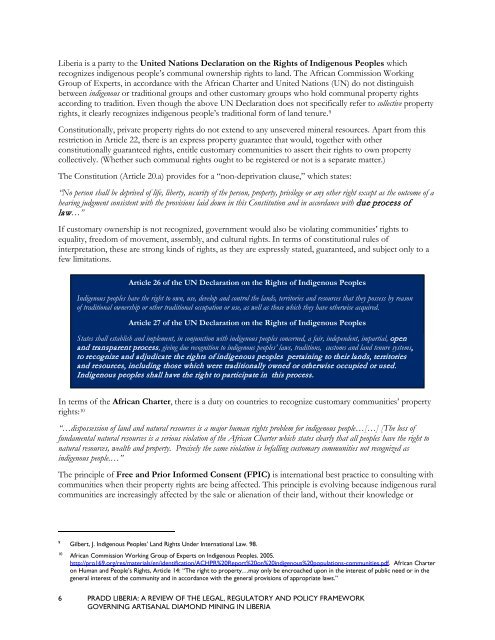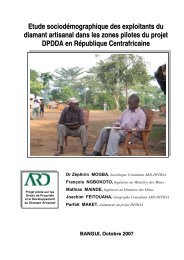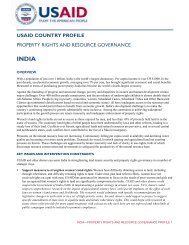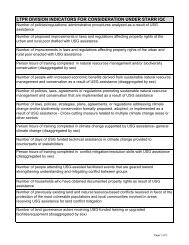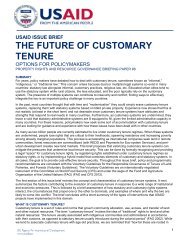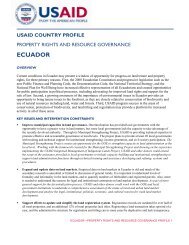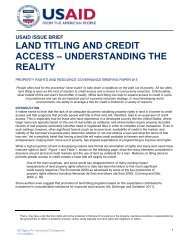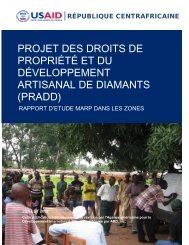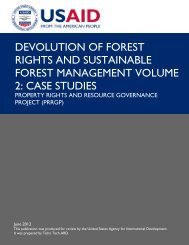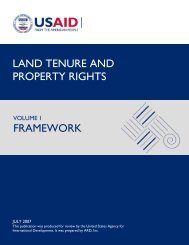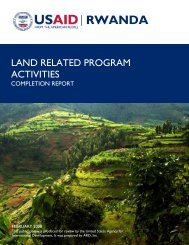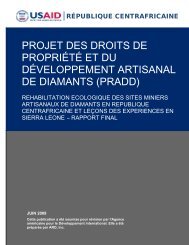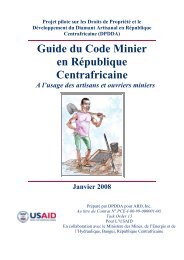(pradd) â liberia - Land Tenure and Property Rights Portal
(pradd) â liberia - Land Tenure and Property Rights Portal
(pradd) â liberia - Land Tenure and Property Rights Portal
- No tags were found...
You also want an ePaper? Increase the reach of your titles
YUMPU automatically turns print PDFs into web optimized ePapers that Google loves.
Liberia is a party to the United Nations Declaration on the <strong>Rights</strong> of Indigenous Peoples whichrecognizes indigenous people’s communal ownership rights to l<strong>and</strong>. The African Commission WorkingGroup of Experts, in accordance with the African Charter <strong>and</strong> United Nations (UN) do not distinguishbetween indigenous or traditional groups <strong>and</strong> other customary groups who hold communal property rightsaccording to tradition. Even though the above UN Declaration does not specifically refer to collective propertyrights, it clearly recognizes indigenous people’s traditional form of l<strong>and</strong> tenure. 9Constitutionally, private property rights do not extend to any unsevered mineral resources. Apart from thisrestriction in Article 22, there is an express property guarantee that would, together with otherconstitutionally guaranteed rights, entitle customary communities to assert their rights to own propertycollectively. (Whether such communal rights ought to be registered or not is a separate matter.)The Constitution (Article 20.a) provides for a “non-deprivation clause,” which states:“No person shall be deprived of life, liberty, security of the person, property, privilege or any other right except as the outcome of ahearing judgment consistent with the provisions laid down in this Constitution <strong>and</strong> in accordance with due process oflaw…”If customary ownership is not recognized, government would also be violating communities’ rights toequality, freedom of movement, assembly, <strong>and</strong> cultural rights. In terms of constitutional rules ofinterpretation, these are strong kinds of rights, as they are expressly stated, guaranteed, <strong>and</strong> subject only to afew limitations.Article 26 of the UN Declaration on the <strong>Rights</strong> of Indigenous PeoplesIndigenous peoples have the right to own, use, develop <strong>and</strong> control the l<strong>and</strong>s, territories <strong>and</strong> resources that they possess by reasonof traditional ownership or other traditional occupation or use, as well as those which they have otherwise acquired.Article 27 of the UN Declaration on the <strong>Rights</strong> of Indigenous PeoplesStates shall establish <strong>and</strong> implement, in conjunction with indigenous peoples concerned, a fair, independent, impartial, open<strong>and</strong> transparent process, giving due recognition to indigenous peoples’ laws, traditions, customs <strong>and</strong> l<strong>and</strong> tenure systems,to recognize <strong>and</strong> adjudicate the rights of indigenous peoples pertaining to their l<strong>and</strong>s, territories<strong>and</strong> resources, including those which were traditionally owned or otherwise occupied or used.Indigenous peoples shall have the right to participate in this process.In terms of the African Charter, there is a duty on countries to recognize customary communities’ propertyrights: 10“…dispossession of l<strong>and</strong> <strong>and</strong> natural resources is a major human rights problem for indigenous people…[…] [The loss offundamental natural resources is a serious violation of the African Charter which states clearly that all peoples have the right tonatural resources, wealth <strong>and</strong> property. Precisely the same violation is befalling customary communities not recognized asindigenous people.…”The principle of Free <strong>and</strong> Prior Informed Consent (FPIC) is international best practice to consulting withcommunities when their property rights are being affected. This principle is evolving because indigenous ruralcommunities are increasingly affected by the sale or alienation of their l<strong>and</strong>, without their knowledge or9Gilbert, J. Indigenous Peoples’ <strong>L<strong>and</strong></strong> <strong>Rights</strong> Under International Law. 98.10African Commission Working Group of Experts on Indigenous Peoples. 2005.http://pro169.org/res/materials/en/identification/ACHPR%20Report%20on%20indigenous%20populations-communities.pdf. African Charteron Human <strong>and</strong> People’s <strong>Rights</strong>, Article 14: “The right to property…may only be encroached upon in the interest of public need or in thegeneral interest of the community <strong>and</strong> in accordance with the general provisions of appropriate laws.”6 PRADD LIBERIA: A REVIEW OF THE LEGAL, REGULATORY AND POLICY FRAMEWORKGOVERNING ARTISANAL DIAMOND MINING IN LIBERIA


